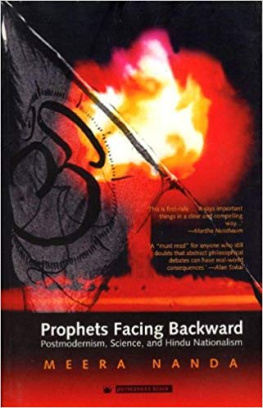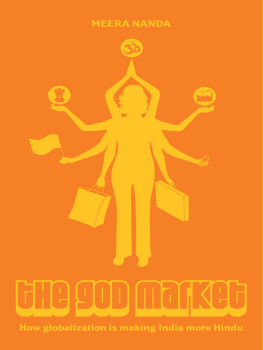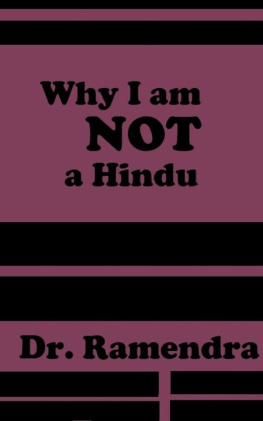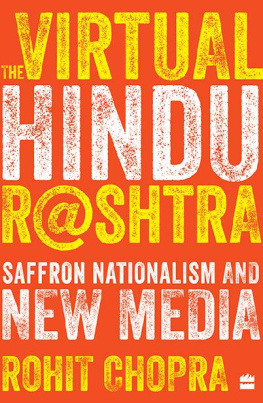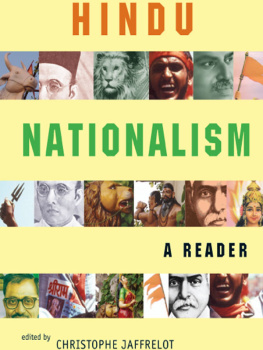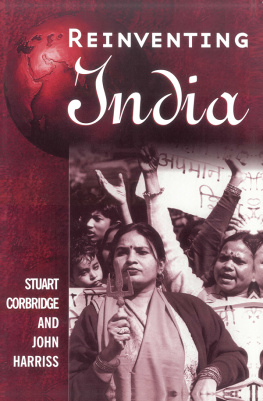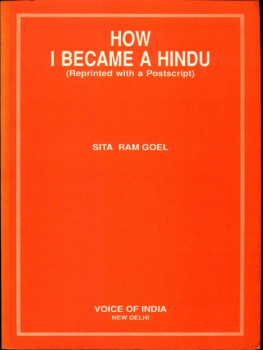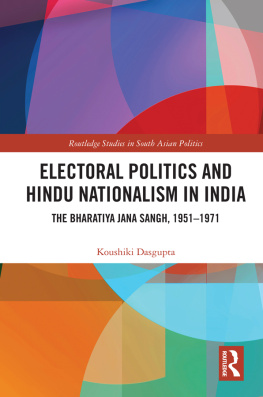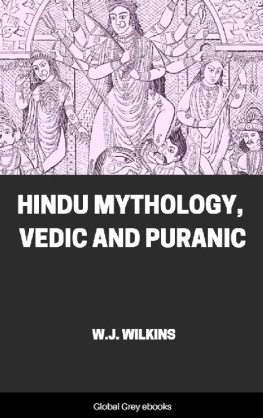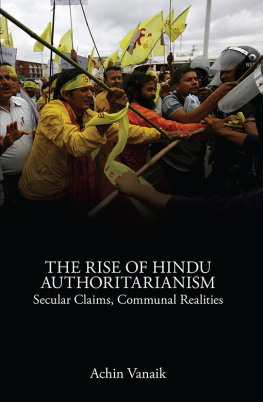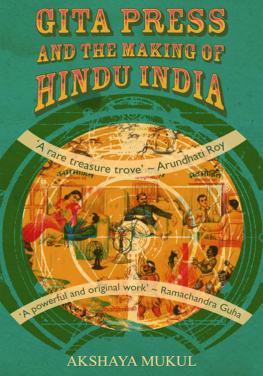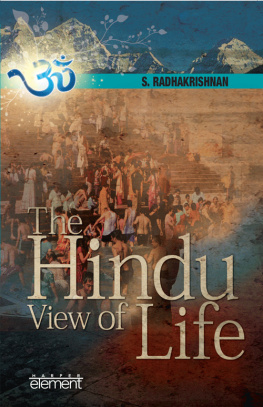Prophets Facing Backward
Postmodern Critiques of Science and Hindu Nationalism in India.
Meera Nanda
Rutgers University Press
New Brunswick, New Jersey, and London
British Cataloging-in-Publication information is available from the British Library.
Copyright 2003 by Meera Nanda All rights reserved
No part of this book may be reproduced or utilized in any form or by any means, electronic or mechanical, or by any information storage and retrieval system, without written permission from the publisher. Please contact Rutgers University Press, 100 Joyce Kilmer Avenue, Piscataway, NJ 088548099. The only exception to this prohibition is "fair use" as defined by U.S. copyright law.
Manufactured in the United States of America
Contents
Part I. HINDU NATIONALISM AND VEDIC SCIENCE
Part II. POSTMODERN CRITIQUES OF SCIENCE
Part III. POSTMODERNISM AND NEW SOCIAL MOVEMENTS IN INDIA
Preface
This is a book I had to write. I had no choice in the matter.
For many years, I have seen modern science being put in its place. For many years, I have heard all the problems of the world we live in being laid at the doorsteps of the Enlightenment. For many years, I have felt as if am drowning in platitudes about cultivating the alternative sciences of women, non-Western peoples and other victims of the modern age.
I could never join the chorus, but nor could I shut out its jarring notes.
Circumstances of biography had brought me into the humanities in the American academia at the height of its postmodernist fervor. The very fundamentals of what constitutes knowledge, how it is constructed and its impact on society were being questioned. It was simply not possible to remain neutral to these fundamental questions and just do your work -- more so, if these debates were challenging your own deeply felt beliefs.
I, a microbiologist by training (Ph.D., Indian Institute of Technology, New Delhi, India), came to America to study philosophy of science. For a variety of reasons, I dropped out after a couple of semesters at the department of History and Philosophy of Science at Indiana University. At that time, continuing with my chosen profession of science writing and journalism made more sense. But I soon tired of skimming the surface of things. My itch for books, ideas and scholarship returned. I sought out the academia one more time. In 1993, I enrolled for another doctorate degree at the department of Science and Technology Studies at Rensselaer Polytechnic Institute in upstate New York, considered one of the pioneers in the field.
In science studies, I came face to face with a radical challenge to -- even a denunciation of -- all that I believed in. I found myself in a discipline whose very founding axioms I disagreed with. With various nuances, science studies teach that modern science as we know it, is a construction of the dominant social interests of Western society, down to its very content and the criteria for justification. As a construct of power, modern science served as a legitimator of Western and patriarchal power around the world. Many of my own compatriots from India had contributed to this literature, arguing that non-Western societies needed a decolonization of the mind that would come about by developing sciences that encoded Indian values, which could still be found among the non-modern women and men in the farms and forests. Even worse, those enunciating these theories were people who professed to speak as feminists, radical democrats, and socialists -- political ideals of the left that I share. The difference, of course, was that while they saw themselves as belonging to the left of the political spectrum because of their suspicion of modern Western science, among other thing, I saw myself as a leftist because of my admiration of modern science, among other things.
Growing up in a provincial town in Northern India, my education in science had been a source of my personal enlightenment. Natural science, especially molecular biology, had given me a whole different perspective on underlying cosmology of the religious and cultural traditions I was raised in. Science gave me good reasons to say a principled No! to many of my inherited beliefs about God, about nature, about women, about duties and rights, about purity and pollution, about social status and about my relationship to my fellow citizens. I had discovered my individuality, and found the courage to assert the right to fulfill my own destiny, because I learnt to demand good reasons for the demands that were put on me.When I came to New Delhi to do my doctorate, I was full of great idealism, and a great love for biology. When I finally gave up a career in research for science writing (I joined the staff of Indian Express as a science correspondent after I completed my doctorate), it was because I thought science was too important to be left confined to the laboratories, and shut in the pages of refereed journals. I was convinced that modern science had a role to play in religious reformation and cultural revolution in Indian society. Without knowing it then, I was speaking the language of the Enlightenment.
I soon found out that science studies had no room for the likes of me.
Enlightenment was seen as the agent of colonialism, and modern science as a discourse of patriarchy and other dominant Western interests. Salvation was to be found in debunking the universalist pretensions of science and encouraging alternative ways of knowing that would end the hubris of the West. Someone like me could only be pitied -- which I often was -- as a colonized mind, dazzled by the superficial charms of the West.
The problem, I discovered, lay not only in the political ambience which overwhelmingly favored a debunking, radical skeptical stance toward science and modernity -- that I could have put up with, even at the cost of intellectual loneliness. The real problem lay in the theoretical rubric of social constructivism which justified the kind of relativist disdain for science that I was encountering. Starting with the Strong Programme, with its various cultural studies and feminist offshoots, joined with the postcolonial theory and post-development critiques, science was assumed to be symmetrical with all other local knowledges, all the way down to the content and cognitive values used for assessing and evaluating evidence of experiments. In all cases alike, the ultimate source of justification was to be found in the prevailing social relations, cultural metaphors and metaphysics. I saw this approach as denying progress and universality of modern science. I also refused to make peace with the extreme indulgence, in the name of respecting cultural differences, toward patent falsehoods in other cultures ontologies, and palpable irrationalities in their ways of relating with nature. What was being celebrated as difference by postmodernists, was more often than not, a source of mental bondage and authoritarianism in non-Western cultures.
This book started as my dissertation in which I decided to answer the constructivist science critics. I had two goals in my dissertation, both of which appear rather limited when I look at them from where I have ended up in this book. My first goal was to show why I could not consent to the dogmas of social constructivism, including feminist and postcolonial epistemologies. I tried to show that these critics did not do justice to science, either as an intellectual inquiry, nor as a cultural weapon for the Enlightenment, especially in non-Western societies. My second goal was to examine the actual track record of postmodernist, alternative science movements in India. I showed in my analysis of Indias ecofeminist opposition to the green revolution, for example, that the critics of science were eventually embracing the same traditions that have kept Indian women tied to home and hearth for centuries. I also tried to find a compromise between the relativism of social constructivism and an old-fashioned realism in the pragmatic realism of the classical American pragmatism of Charles Pierce and John Dewey.

